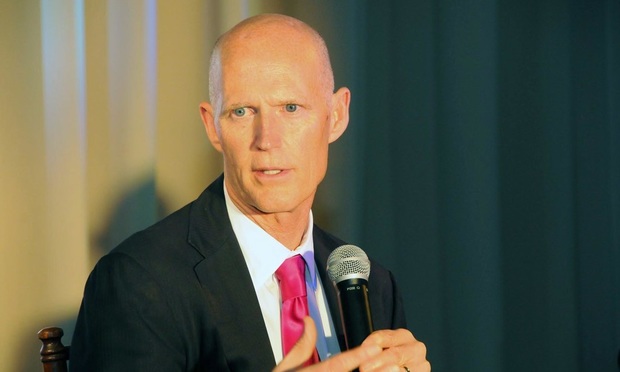Citing Precedent, Scott Seeks Joint Appointments to Supreme Court
Gov. Rick Scott wants the court to modify an Oct. 15 order that gave the “sole authority” for those Supreme Court appointments to the winner of Tuesday's gubernatorial election.
November 01, 2018 at 10:54 AM
5 minute read
 Florida Gov. Rick Scott/Photo courtesy of Jill Kahn
Florida Gov. Rick Scott/Photo courtesy of Jill Kahn
In another move in a closely watched case, Gov. Rick Scott is asking the Florida Supreme Court to allow him and the newly elected governor to jointly appoint three justices to the state's highest court.
Scott wants the court to modify an Oct. 15 order that gave the “sole authority” for those Supreme Court appointments to the winner of Tuesday's gubernatorial election between Republican Ron DeSantis and Democrat Andrew Gillum.
In a brief filed Tuesday night, Scott's lawyers asked the court to grant a rehearing and to “clarify” the order, which said the new governor, who will take office on Jan. 8, has the authority to appoint replacements for Justices Barbara Pariente, R. Fred Lewis and Peggy Quince. The three longtime justices will leave the court in January because they have reached a mandatory retirement age.
The Supreme Court will hear arguments Nov. 8 on the timing of a Supreme Court Judicial Nominating Commission decision to certify a list of potential new justices from a pool of 59 lawyers and judges who have applied for the upcoming vacancies.
The nominating commission is scheduled to interview all the applicants over a period of four days, Saturday and Sunday in Miami, and Nov. 8 and Nov. 9 in Tampa.
In another legal filing last week, the League of Women Voters of Florida and Common Cause, the groups that originally challenged Scott's decision to involve himself in the appointments, have asked the court to order reopening the application process with a deadline of no earlier than Jan. 8.
In the governor's brief, his lawyers are asking the court to strike the language from the Oct. 15 order that gave the “sole authority” for the appointments to the new governor.
The original challenge filed by the League of Women Voters and Common Cause, which sought to block the governor's actions through a legal procedure known as a writ of quo warranto, was “directed entirely” to the nomination process and not the governor's appointment powers, the brief said.
“The Oct. 15 order appears to have overlooked or misapprehended the distinction between the nomination and appointment processes,” the governor's brief said. “Only certain discrete aspects of the nomination process have been challenged via a petition for quo warranto in this proceeding.”
In addition to striking the “sole authority” language, the governor's lawyers want the court to expand on provisions in the Oct. 15 order that noted Scott could make the appointments if the justices left before their terms expired or if the new governor failed to take office at midnight between Jan. 7 and Jan. 8.
None of the justices have indicated they plan to step down before their terms expire on Jan. 8. And the winner of the governor's race is expected to take the oath of office before inauguration day, effectively beginning his term at midnight on Jan. 8 when the justices' terms expire.
The governor's lawyers want the court to acknowledge “another circumstance” under which Scott could make the appointments “with the concurrence of the governor-elect.”
The brief cites the precedent of Gov. Lawton Chiles and incoming Gov. Jeb Bush agreeing on the appointment of Quince in 1998. Chiles made the appointment on Dec. 11 under the agreement with Bush, who did not take office until January 1999.
Scott's lawyers noted it “was precisely those circumstances” that the governor invoked when he directed the Supreme Court Judicial Nominating Commission to accept applicants for the upcoming court vacancies and to certify a list of potential justices by Nov. 10, with the argument it would avoid a prolonged court vacancy.
“The governor's expectation is that he and the governor-elect — like Gov. Chiles and then Gov.-elect Bush — will agree on the selection of three justices who will serve with distinction,” the brief said, quoting a press release from Scott's office about the appointment process.
But the League of Women Voters and Common Cause filed a response Wednesday that argued the Supreme Court should reject Scott's request for a rehearing. The filing said the governor's request is, “at bottom, just the latest in a long line of attempts to further control the judicial nominating process and taint it with his partisan policy preferences.”
“In any event, Governor Scott still points to no provision in the Florida Constitution, no statute, and no case law for the remarkable suggestion that two different governors must share the power to appoint judges under certain circumstances,” attorneys for the League of Women Voters and Common Cause wrote. “The exercise of solemn constitutional duties like this should not be fodder for back-room political dealing. While the person elected governor on November 6 is certainly free to consult with Governor Scott (or anyone else for that matter) as to how to exercise his appointment power, there is no legal requirement that he do so.”
The Supreme Court appointments are drawing heavy scrutiny because they could shift the ideological direction of the state's highest court for years to come.
Pariente, Lewis and Quince are part of a liberal bloc, which now holds a slim 4-3 majority on the seven-member court. They have helped thwart Scott and the Republican-dominated Legislature on numerous occasions since the governor took office in 2011.
Lloyd Dunkelberger reports for the News Service of Florida.
This content has been archived. It is available through our partners, LexisNexis® and Bloomberg Law.
To view this content, please continue to their sites.
Not a Lexis Subscriber?
Subscribe Now
Not a Bloomberg Law Subscriber?
Subscribe Now
NOT FOR REPRINT
© 2025 ALM Global, LLC, All Rights Reserved. Request academic re-use from www.copyright.com. All other uses, submit a request to [email protected]. For more information visit Asset & Logo Licensing.
You Might Like
View All
Tragedy on I-95: Florida Lawsuit Against Horizon Freight System Could Set New Precedent in Crash Cases
2 minute read
'You Lied to the Jury': Veteran Awarded $5 Million in Defamation Case Against CNN
4 minute read
Vedder Price Shareholder Javier Lopez Appointed to Miami Planning, Zoning & Appeals Board
2 minute readTrending Stories
Who Got The Work
J. Brugh Lower of Gibbons has entered an appearance for industrial equipment supplier Devco Corporation in a pending trademark infringement lawsuit. The suit, accusing the defendant of selling knock-off Graco products, was filed Dec. 18 in New Jersey District Court by Rivkin Radler on behalf of Graco Inc. and Graco Minnesota. The case, assigned to U.S. District Judge Zahid N. Quraishi, is 3:24-cv-11294, Graco Inc. et al v. Devco Corporation.
Who Got The Work
Rebecca Maller-Stein and Kent A. Yalowitz of Arnold & Porter Kaye Scholer have entered their appearances for Hanaco Venture Capital and its executives, Lior Prosor and David Frankel, in a pending securities lawsuit. The action, filed on Dec. 24 in New York Southern District Court by Zell, Aron & Co. on behalf of Goldeneye Advisors, accuses the defendants of negligently and fraudulently managing the plaintiff's $1 million investment. The case, assigned to U.S. District Judge Vernon S. Broderick, is 1:24-cv-09918, Goldeneye Advisors, LLC v. Hanaco Venture Capital, Ltd. et al.
Who Got The Work
Attorneys from A&O Shearman has stepped in as defense counsel for Toronto-Dominion Bank and other defendants in a pending securities class action. The suit, filed Dec. 11 in New York Southern District Court by Bleichmar Fonti & Auld, accuses the defendants of concealing the bank's 'pervasive' deficiencies in regards to its compliance with the Bank Secrecy Act and the quality of its anti-money laundering controls. The case, assigned to U.S. District Judge Arun Subramanian, is 1:24-cv-09445, Gonzalez v. The Toronto-Dominion Bank et al.
Who Got The Work
Crown Castle International, a Pennsylvania company providing shared communications infrastructure, has turned to Luke D. Wolf of Gordon Rees Scully Mansukhani to fend off a pending breach-of-contract lawsuit. The court action, filed Nov. 25 in Michigan Eastern District Court by Hooper Hathaway PC on behalf of The Town Residences LLC, accuses Crown Castle of failing to transfer approximately $30,000 in utility payments from T-Mobile in breach of a roof-top lease and assignment agreement. The case, assigned to U.S. District Judge Susan K. Declercq, is 2:24-cv-13131, The Town Residences LLC v. T-Mobile US, Inc. et al.
Who Got The Work
Wilfred P. Coronato and Daniel M. Schwartz of McCarter & English have stepped in as defense counsel to Electrolux Home Products Inc. in a pending product liability lawsuit. The court action, filed Nov. 26 in New York Eastern District Court by Poulos Lopiccolo PC and Nagel Rice LLP on behalf of David Stern, alleges that the defendant's refrigerators’ drawers and shelving repeatedly break and fall apart within months after purchase. The case, assigned to U.S. District Judge Joan M. Azrack, is 2:24-cv-08204, Stern v. Electrolux Home Products, Inc.
Featured Firms
Law Offices of Gary Martin Hays & Associates, P.C.
(470) 294-1674
Law Offices of Mark E. Salomone
(857) 444-6468
Smith & Hassler
(713) 739-1250







